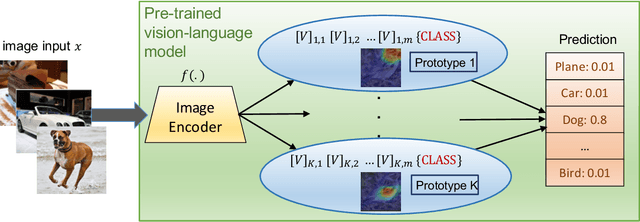Prompting through Prototype: A Prototype-based Prompt Learning on Pretrained Vision-Language Models
Paper and Code
Oct 19, 2022



Prompt learning is a new learning paradigm which reformulates downstream tasks as similar pretraining tasks on pretrained models by leveraging textual prompts. Recent works have demonstrated that prompt learning is particularly useful for few-shot learning, where there is limited training data. Depending on the granularity of prompts, those methods can be roughly divided into task-level prompting and instance-level prompting. Task-level prompting methods learn one universal prompt for all input samples, which is efficient but ineffective to capture subtle differences among different classes. Instance-level prompting methods learn a specific prompt for each input, though effective but inefficient. In this work, we develop a novel prototype-based prompt learning method to overcome the above limitations. In particular, we focus on few-shot image recognition tasks on pretrained vision-language models (PVLMs) and develop a method of prompting through prototype (PTP), where we define $K$ image prototypes and $K$ prompt prototypes. In PTP, the image prototype represents a centroid of a certain image cluster in the latent space and a prompt prototype is defined as a soft prompt in the continuous space. The similarity between a query image and an image prototype determines how much this prediction relies on the corresponding prompt prototype. Hence, in PTP, similar images will utilize similar prompting ways. Through extensive experiments on seven real-world benchmarks, we show that PTP is an effective method to leverage the latent knowledge and adaptive to various PVLMs. Moreover, through detailed analysis, we discuss pros and cons for prompt learning and parameter-efficient fine-tuning under the context of few-shot learning.
 Add to Chrome
Add to Chrome Add to Firefox
Add to Firefox Add to Edge
Add to Edge